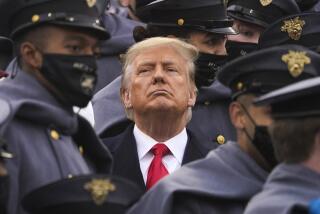Analysis: Trump vows action on mass shootings but faces familiar barriers, some of his own making
While President Trump vowed Monday to end years of political gridlock in responding to mass shootings by getting tough with the National Rifle Assn. and Congress, he is facing familiar barriers — including his own unpredictable, and occasionally inconsistent, policy actions.
Even as Trump urged governors at a White House meeting to confront the gun rights group, he promoted proposals it likes, including arming teachers, and said nothing about his previous idea to raise the minimum age for long-gun buyers to 21, which the NRA opposes.
Over the weekend, the president divulged, he’d had lunch with NRA leaders including Executive Vice President Wayne LaPierre. “These guys are great patriots,” Trump told the governors. “They’re great people and they want to do something.”
Though the president had called for legislative action this week, with Congress returning from a break, momentum already is bogging down in part because of his shifting statements on gun control. In the nearly two weeks since the shootings in Parkland, Fla., Trump has made policy on the fly in front of television cameras, revealing the fluidity of his thinking as well as the influence of the NRA.
Also, many lawmakers facing difficult midterm elections this year seem in no hurry to stake out positions on the long-contentious topic. Officials on Capitol Hill suggested that no substantial gun measures are on tap for the short term.
Trump’s idea for arming some school personnel has gotten little support among lawmakers or governors of either party. Gov. Jay Inslee of Washington state, a Democrat, told Trump that neither teachers nor many local law enforcement officials favored the idea, and added, “I just suggest we need a little less tweeting here and a little more listening.”
Trump’s meeting with about three dozen governors was his third “listening session” since a gunman killed 17 students and adults at Marjory Stoneman Douglas High School in Parkland. Previously the president solicited suggestions from local officials and survivors of past shootings.
More emphatically than he has before, Trump vowed to use his own authority to ban “bump stocks,” the devices used to make legal semiautomatic guns fire more like illegal automatic weapons. The president first raised the idea in October, after a gunman in Las Vegas used a bump stock to shoot hundreds of concert-goers and kill 58, but then the administration dropped it.
Though the Parkland shooter apparently didn’t use a bump stock, Trump has revived the idea of banning them by federal regulation. “I’m writing that out myself,” he said. “I don’t care if Congress does it or not.”
The NRA has said it could support a bump stock ban by regulation, as Trump proposes, but not a new law. The regulatory route suggests a quandary: the federal Bureau of Alcohol, Tobacco, Firearms and Explosives has said in the past that, without a new law, it doesn’t have the power to ban bump stocks. Also, gun manufacturers probably would sue to contest such a regulatory ban.
White House Press Secretary Sarah Huckabee Sanders said Trump planned to meet with lawmakers on Wednesday to talk about guns policy, and insisted he wasn’t backing away from any of his ideas, including the one to set a minimum age of 21 for long-gun purchases.
Still, Republican lawmakers worry that Trump might eventually switch positions and leave them exposed to the wrath of the NRA and its highly motivated voters.
As they note, Trump opened the recent immigration debate with a similarly aggressive pitch to lawmakers to compromise and promised he’d give them “political cover” against anti-immigration Republican voters. Later, however, after pressure from hard-line advisors and others, he reversed himself and threatened to veto a bipartisan measure, dooming it.
The gun debate is exploding just as party primaries are looming, a time in which incumbents are reluctant to alienate their party’s most loyal supporters — which in the case of Republicans includes a large swath of gun owners.
New polling suggests that Americans are more in favor of gun restrictions since the Florida shooting, but pro-gun sentiment remains high among Republicans voters.
Several measures are circulating in Congress, prompted by past gun massacres. The House earlier passed a bill that would eliminate some loopholes in the federal background check system. But Democrats opposed that measure because it would also allow gun owners to carry concealed weapons across state lines, including into states where that currently isn’t legal.
A bipartisan Senate version of the background checks bill, sponsored by Sen. John Cornyn of Texas, a Republican, and Democratic Sen. Christopher S. Murphy of Connecticut, doesn’t include the concealed weapons language. Written in response to a mass shooting in November at a church in Sutherland Springs, Texas, the measure seeks to get state and federal agencies to be more rigorous in forwarding any incriminating records involving prospective gun buyers.
After the Sutherland Springs shooting, it was found that the Air Force failed to send information to the federal database about a domestic abuse conviction against the shooter, which could have blocked his weapons purchase.
Even if the Senate passed its version, without the expansion of “concealed carry” across state lines, gun rights advocates say Republican leaders promised it would be tabled in the House, said Michael Hammond, legislative counsel for the group Gun Owners of America.
Sen. Dianne Feinstein, the California Democrat who sponsored a 1994 law that banned some semiautomatic rifles for 10 years, announced on Friday that she would push to raise the age for their purchase from 18 to 21. As a member of the minority party, however, she and other Democrats are limited in their power to raise the bills.
In a statement Monday, Democratic Senate leader Charles E. Schumer of New York said that if congressional action is limited to tightening the background check system, “it would be an abject failure and a dereliction of our duty.”
He called for additional background check changes, including closing the loophole that allows purchases at gun shows and over the internet to avoid the checks. Neither the House nor Senate measure would do that.
“We can’t afford a bill that is simply aimed at pleasing the NRA but doesn’t get the job done,” Schumer said.
Hammond said that proposals to end background check loopholes, outlaw bump stocks or expand the use of protective orders to take guns from civilians would be tantamount to “the 2nd Amendment Repeal Act.”
Twitter: @cparsons
More to Read
Get the L.A. Times Politics newsletter
Deeply reported insights into legislation, politics and policy from Sacramento, Washington and beyond. In your inbox three times per week.
You may occasionally receive promotional content from the Los Angeles Times.








